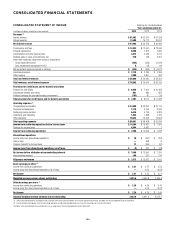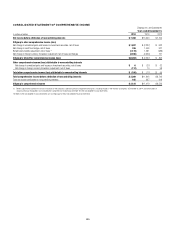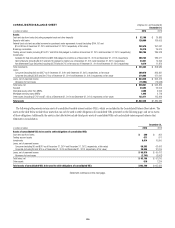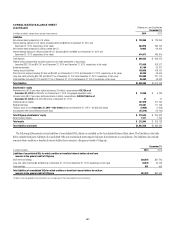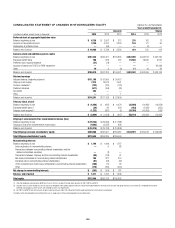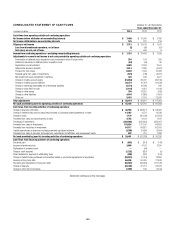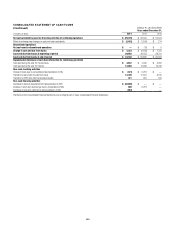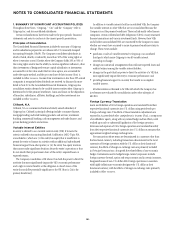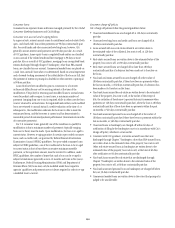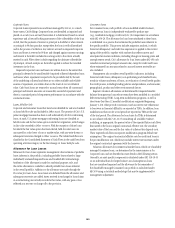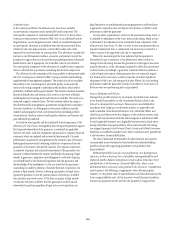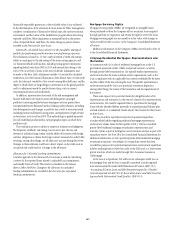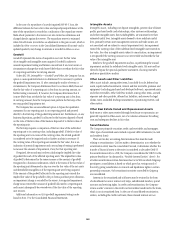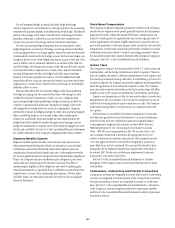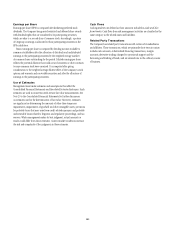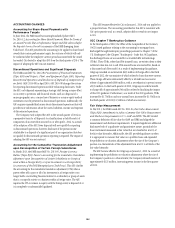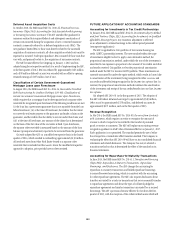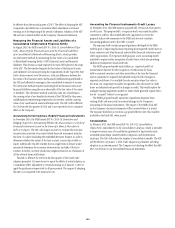Citibank 2014 Annual Report Download - page 161
Download and view the complete annual report
Please find page 161 of the 2014 Citibank annual report below. You can navigate through the pages in the report by either clicking on the pages listed below, or by using the keyword search tool below to find specific information within the annual report.144
Consumer loans
Consumer loans represent loans and leases managed primarily by the Global
Consumer Banking businesses and Citi Holdings.
Consumer non-accrual and re-aging policies
As a general rule, interest accrual ceases for installment and real estate (both
open- and closed-end) loans when payments are 90 days contractually past
due. For credit cards and other unsecured revolving loans, however, Citi
generally accrues interest until payments are 180 days past due. As a result
of OCC guidance, home equity loans in regulated bank entities are classified
as non-accrual if the related residential first mortgage is 90 days or more
past due. Also as a result of OCC guidance, mortgage loans in regulated bank
entities discharged through Chapter 7 bankruptcy, other than FHA-insured
loans, are classified as non-accrual. Commercial market loans are placed on
a cash (non-accrual) basis when it is determined, based on actual experience
and a forward-looking assessment of the collectability of the loan in full, that
the payment of interest or principal is doubtful or when interest or principal
is 90 days past due.
Loans that have been modified to grant a concession to a borrower
in financial difficulty may not be accruing interest at the time of the
modification. The policy for returning such modified loans to accrual status
varies by product and/or region. In most cases, a minimum number of
payments (ranging from one to six) is required, while in other cases the loan
is never returned to accrual status. For regulated bank entities, such modified
loans are returned to accrual status if a credit evaluation at the time of, or
subsequent to, the modification indicates the borrower is able to meet the
restructured terms, and the borrower is current and has demonstrated a
reasonable period of sustained payment performance (minimum six months
of consecutive payments).
For U.S. consumer loans, generally one of the conditions to qualify for
modification is that a minimum number of payments (typically ranging
from one to three) must be made. Upon modification, the loan is re-aged to
current status. However, re-aging practices for certain open-ended consumer
loans, such as credit cards, are governed by Federal Financial Institutions
Examination Council (FFIEC) guidelines. For open-ended consumer loans
subject to FFIEC guidelines, one of the conditions for the loan to be re-aged
to current status is that at least three consecutive minimum monthly
payments, or the equivalent amount, must be received. In addition, under
FFIEC guidelines, the number of times that such a loan can be re-aged is
subject to limitations (generally once in 12 months and twice in five years).
Furthermore, Federal Housing Administration (FHA) and Department of
Veterans Affairs (VA) loans may only be modified under those respective
agencies’ guidelines and payments are not always required in order to re-age
a modified loan to current.
Consumer charge-off policies
Citi’s charge-off policies follow the general guidelines below:
• Unsecured installment loans are charged off at 120 days contractually
past due.
• Unsecured revolving loans and credit card loans are charged off at
180 days contractually past due.
• Loans secured with non-real estate collateral are written down to
the estimated value of the collateral, less costs to sell, at 120 days
contractually past due.
• Real estate-secured loans are written down to the estimated value of the
property, less costs to sell, at 180 days contractually past due.
• Real estate-secured loans are charged off no later than 180 days
contractually past due if a decision has been made not to foreclose on
the loans.
• Non-bank real estate-secured loans are charged off at the earlier of
180 days contractually past due, if there have been no payments within
the last six months, or 360 days contractually past due, if a decision has
been made not to foreclose on the loans.
• Non-bank loans secured by real estate are written down to the estimated
value of the property, less costs to sell, at the earlier of the receipt of
title, the initiation of foreclosure (a process that must commence when
payments are 120 days contractually past due), when the loan is 180 days
contractually past due if there have been no payments within the past
six months or 360 days contractually past due.
• Non-bank unsecured personal loans are charged off at the earlier of
180 days contractually past due if there have been no payments within the
last six months, or 360 days contractually past due.
• Unsecured loans in bankruptcy are charged off within 60 days of
notification of filing by the bankruptcy court or in accordance with Citi’s
charge-off policy, whichever occurs earlier.
• Consistent with OCC guidance, real estate-secured loans that were
discharged through Chapter 7 bankruptcy, other than FHA-insured loans,
are written down to the estimated value of the property, less costs to sell.
Other real estate-secured loans in bankruptcy are written down to the
estimated value of the property, less costs to sell, at the later of 60 days
after notification or 60 days contractually past due.
• Non-bank loans secured by real estate that are discharged through
Chapter 7 bankruptcy are written down to the estimated value of the
property, less costs to sell, at 60 days contractually past due.
• Non-bank unsecured personal loans in bankruptcy are charged off when
they are 30 days contractually past due.
• Commercial market loans are written down to the extent that principal is
judged to be uncollectable.


